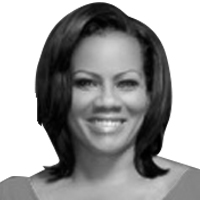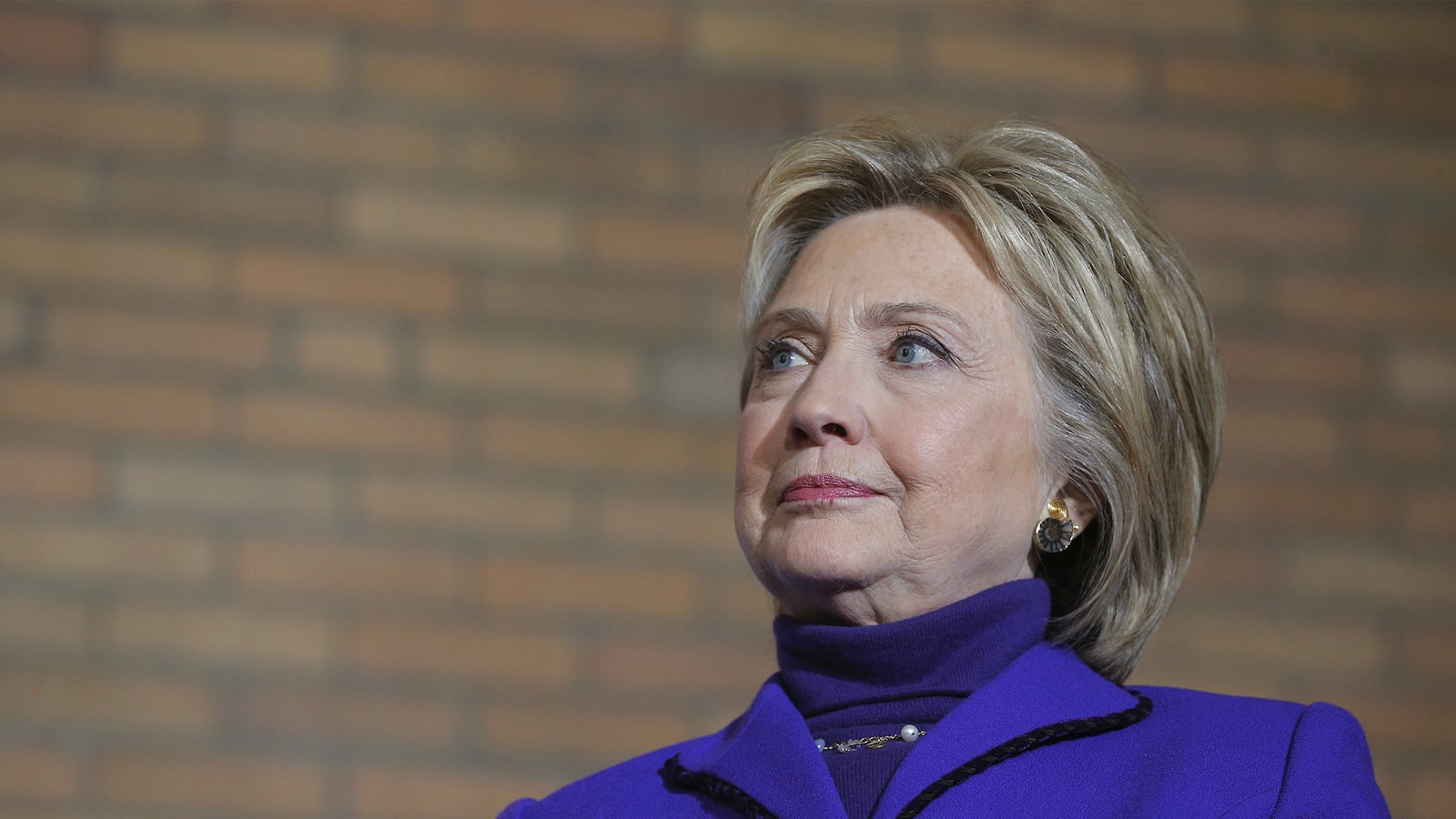At a CNN town hall, in Derry, New Hampshire, Hillary Clinton got the opportunity she was looking for— the chance to tell the country who she is. It was a moment that no briefing book loaded with talking points could have prepared her to answer.
Without fanfare, Clinton opened a window of intimacy that has, until now, proven elusive. Without speaking the words explicitly, she said, “Here’s why you can trust me.”
She wasn’t responding to question involving domestic or foreign policy, nor was it a query aimed at drawing contrasts with her competitors. Instead, the question posed by Rabbi Jonathan Spira-Savett was decidedly more personal and required a brand of introspection that has become all too rare in the public discourse.
“How do you cultivate the ego, the ego that we all know you must have, a person must have to be the leader of the free world, and also the humility to recognize that we know that you can’t be expected to be wise about all the things that the president has to be responsible for?”
She could’ve sputtered something about grace or offered feigned humility. She could’ve talked about the profound challenges before us a nation and trumpeted her experience in various policy areas. It is doubtful that Clinton was thinking about her polling numbers as she began to speak. Instead, in an unanticipated dose of candor, she talked openly about her personal faith and how those convictions guide her.
If only for a fleeting moment, Clinton appeared vulnerable—giving in to her own human frailty.
Spira-Savett, leader of the Conservative Beth Abraham in Nashua, started by quoting a Hassidic tale from the 18th century sage Rabbi Simcha Bunim about finding a balance between ego and humility.
“Every person has to have two pockets and in each pocket they have to carry a different note. And the note in one pocket says the universe was created for me. And in the other pocket the note says I am just dust and ashes,” the rabbi said, reciting the anecdote.
The answer was intriguing, if not revealing.
“It’s not anything I’ve ever talked about much publicly,” she said. “Everybody knows that I've lived a very public life for the last 25 years. So I’ve had to be in public dealing with some very difficult issues.”
Sometimes she “roars” and sometimes she “retreats,” Clinton answered, alluding to some of the public scandals she and her husband have endured. She could have easily said Monica Lewinski, Whitewater, Travel Gate, or Benghazi. There was no need to call them by name. More critically, however, Clinton focused her response on a professed adherence to a contemporary theology popularized by Dutch theologian Henri Nouwen: the discipline of gratitude.
"And it basically is: Practice the discipline of gratitude," she continued.
“The discipline of gratitude is the explicit effort to acknowledge that all I am and have is given to me as a gift of love, a gift to be celebrated with joy,” Nouwen wrote.
The philosophy that follows dictates that giving freely of oneself—not necessarily regular, systematic, even strategic—is a conscious choice to be a good steward of God’s blessings. It is a reminder that believers are not free possessors but acting out of obligation to their faith. It is a recognition that all of life is a gift, according to Nouwen.
The question now is how has that driven Clinton’s previous policy positions, including controversial Senate votes and even her support for her husband’s White House agenda, and how will the doctrine inform how she chooses to govern.
It is not that Clinton, who was reared in the United Methodist tradition, had not previously written or spoken about her spirituality. Those closest to Clinton will tell you that she is “deeply religious.”
In It Takes a Village and Other Lessons Children Teach Us, for instance, she wrote, “Our spiritual life as a family was spirited and constant. We talked with God, walked with God, ate, studied and argued with God. Each night, we knelt by our beds to pray before we went to sleep.”
And it was not the first time she referenced Nouwen, a widely published Catholic priest, professor, and writer. Before his death in 1996, Nouwen authored 39 books and hundreds of articles. It was in 1994, two years before he died, that his most prominent work found its way into the then-First Lady’s hands. And it could not have come at a more crucial time—a year after Bill Clinton was sworn in as commander-in-chief and amid a period of mourning and swelling controversies.
“It was given to me by a friend in 1994 after I had experienced some tragic and painful losses—my father, my mother-in-law, and our dear friend Vince Foster all died,” she said of Nouwen’s book The Return of the Prodigal Son. “I was reading a lot of Scripture and theology and other books of inspiration at the time. This book struck a responsive chord, because the story is such a moving and constructive parable about what matters in life.”
That Clinton took refuge in prayer and meditation should be not surprising. If one were to point to one of the more seminal points in Clinton’s history, 1994 might take second only to 1998—the year Monica Lewinski entered the national discourse.
“By consciously reminding myself of my blessings,” she wrote for Oprah.com, “I could move from pessimism to optimism, from grief to hopefulness.”
If only for a fleeting moment on prime time television, Clinton confronted the same question she has faced from onset of her political life: Who am I?
Depending on what you believe about Clinton, her reference to Nouwen was either a premeditated ploy or a window into her soul. Her naysayers would readily tell you that Clinton is a calculated fraud. Her supporters, on the other hand, will tell you that she is a pragmatic, yet tireless fighter for the least of these. Both certainly cannot be true. And if Clinton is going to win, she’ll have to prove the former wrong and woo a good many skeptical independents (and left-wing Democrats) into the fold. Clinton understands that divide better than anyone—even better than those who work daily to exploit that weakness.
“I’ve had to deal and struggle with a lot of these issues about ambition and humility about service and self-gratification, all of the human questions that all of us deal with,” she said at the town hall. “But when you put yourself out into the public arena, I think it is incumbent upon you to be as self-conscious as possible.”
Despite the early and impassioned rise of Bernie Sanders and the fisticuffs going on in the Republican primary, it is difficult not to believe that Clinton will be our nation’s 45th president. Maybe that’s hasty to say since the race has barely begun to unfold, but—for better or worse—as a nation we appear to be resigned to the idea that Bill Clinton will soon be picking out curtains and china patterns.
Yet, in the midst of a hard-fought presidential primary, the near-bout-presumptive nominee and all-too-likely next occupant of the Oval Office now faces the most unlikely and formidable opponent of them all: herself.
Her challenge now is to keep that window of intimacy open and to introduce herself to the country—not the one standing under the Klieg lights waving at crowds of supporters or the one batting back a debate moderator’s questions, but the one who will answer the proverbial 3 a.m. call, whether it comes from Flint or Moscow, from Syria, Paris, or Baltimore.
It is admittedly a challenge not to see Clinton in political terms, though it’s a footing that she has fashioned for herself. She has been nowhere and achieved nothing by accident. Happenstance has never been her calling card.
Clinton has spent much of her public life on a plane—jetting around the globe meeting with heads of state, brokering coalitions for both peace and war, hopscotching the country to galvanize primary voters in her first (and now second) bid for the presidency, campaigning on behalf of down-ticket Democrats far and wide, delivering high-dollar speeches, and raising money for her family foundation. Even when her name is not on the ballot, Clinton’s proverbial hat is always in the ring.
For all of her globetrotting—and maybe because of it—there is little left unknown about the Democratic front-runner. Once the nation’s top diplomat, the wife of a man once known as “the leader of the free world” and a former U.S. senator, her public record has been litigated with an unenviable (and often breathtaking) level of granularity. Political foes, journalists, congressional committees, government investigators, civil attorneys, and anyone else with an Internet connection hailing from sea to shining sea has collectively poured millions into “vetting” Clinton and her husband.
Clinton is the living embodiment of a Rorschach test—a perfect reflection of every negative and positive attribute cast upon her. The issue of her “likeability” appears to be hinged not on her experience or command of the issues, but on whether or not Americans find the former First Lady trustworthy—can you believe what she tells you about this or that? Perceptions about her authenticity have certainly dogged Clinton almost from the inception of her 25 years in public life.
But once one gets beyond the well-polished veneers, craftsman-like hewn talking points and the entire pretense that comes along with living out a life on the public stage, can we truly say what motivates her? Clinton tells us it is that discipline of gratitude.
“Be grateful for your limitations, know that you have to reach out to have more people be with you, to support you, to advise you,” Clinton said in her answer at the town hall. “Listen to your critics, answer the questions, but at the end, be grateful.”
Certainly, those limitations and the depth of her gratitude will be tested in the coming weeks and months of the campaign. Clinton may well win the White House, but how tightly the country embraces her may depend on how willing she is to keep the window open.






